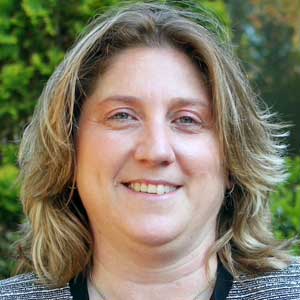Education Section Chair
Kimberly Clark
MS in Respiratory Care Program Director, Clinical Associate Professor
University of North Carolina at Charlotte
Member Since: 2001
AARC Activities:
- Member, AS to BS Conversion Committee, 2019-present
- Manuscript Peer Reviewer, Respiratory Care, 2012-present; Editorial Board Member, Respiratory Care Education Annual, 2021-present; Project Lead, AARC Education Section Faculty Development Project, 2020-2022
- Member, Education Section, 2001-2023
HOD Activities:
- Delegate, North Carolina Society for Respiratory Care, 2019-2022
- Co-Chair, Progress & Transitions Committee, 2020-2021; Co-Chair, Affiliate Best Practices Committee, 2020-2022
- Member, Policy Manual Delegate Guide Committee, 2019-2022, Member, HOD Horizon Goal Affiliate Strength, 2020-2022; Member, HOD Horizon Goal Communications, 2020-2022; Member, HOD Horizon Goal Education Professional Development, 2020-2022
Affiliate Activities:
- President, North Carolina Society for Respiratory Care, 2011; Past-President, 2012; President-Elect, 2010; Treasurer, 2009
- Board of Directors, North Carolina Society for Respiratory Care, 2008
- Chair, Standing Rules & Bylaws, 2013; Chair, Long Range Planning Committee, 2010; Co-Chair, Budget/Audit Committee, 2009; Chair, Nominations Committee, 2009
- Member, Elections Committee, 2009
Related Organizations:
- Vice President of External Affairs, Coalition for Baccalaureate and Graduate Respiratory Therapy Education, 2022-2023; Board of Directors, Coalition for Baccalaureate and Graduate Respiratory Therapy Education, 2020-2024; Chair, Advanced Practice Respiratory Therapy Committee, Coalition for Baccalaureate and Graduate Respiratory Therapy Education, 2020-2022
- Vice Chair, North Carolina Association for Respiratory Educators, 2021-2022; Chair, Education Committee, North Carolina Respiratory Care Board, 2012; Secretary, North Carolina Respiratory Care Board, 2012; Board of Directors, North Carolina Respiratory Care Board, 2009-2012; Member, Membership Committee, National Academy for Health and Physical Literacy, 2021-2022
Education:
- EdD in Kinesiology, University of North Carolina at Greensboro, Greensboro, 2019
- EdD in Education Leadership, University of North Carolina at Charlotte, Charlotte, 2009
- MBA, West Virginia University, Morgantown, 2000
Publications:
- “Teaching evidence-based practice in respiratory therapy education: A pilot study,” author, 2021, Respiratory Care Education Annual.
- “New models for strengthening graduate respiratory care education,” co-author, 2021, Respiratory Care Education Annual.
- “Simulations using telehealth to collaborate with other health-care professionals: effect on pre-licensure nursing students’ competencies and amount of collaboration in the clinical setting,” co-author, 2020, Journal of Interprofessional Care.
- “Ventilator graphics: scalars, loops & secondary measures,” co-author, 2020, Respiratory Care
Elections Committee Questions:
What do you see as the biggest challenge facing the AARC and what do you recommend to address it?
The biggest challenge I see facing the AARC is the steady declining enrollment in respiratory therapy education programs that has been occurring since 2010, which is compounded by the closing of many programs during the same time frame. With only 10% of respiratory therapy programs at enrollment capacity across the country, the workforce shortage will continue to persist at critical levels. I would like to see the creation of an impactful and sustainable investment in promoting respiratory therapy education programs to reinvigorate the interest in one of the fastest growing health careers in the country. We need to create model programs with guidance to inform higher education decision makers on the benefits of starting new respiratory therapy programs and help existing programs with recruitment strategies and tools for marketing and promotion. Our profession is only as strong as the investment we make in a vision of advancing our profession through education.
What ideas do you have to help todays Respiratory Therapist recover from the pandemic and what do you feel is the main issue Respiratory Care Practitioners are facing, and what key solutions should be addressed to support our profession?
While the COVID-19 pandemic brought recognition to respiratory therapists as essential frontline health professionals, the documented rate of burnout is a significant risk for retaining current RTs and a possible deterrent for recruiting aspiring RTs. Much of the current literature is focusing on burnout related to the pandemic, which are important issues that need to be studied and addressed. I would recommend launching a series of commissioned research studies aimed at examining resilience and self-efficacy among RTs related to their response during the pandemic and as we begin to transition from the pandemic. Studies should also seek to examine self-care measures that RTs used to reduce stress and improve overall resilience. The next step should be the creation of resilience resources for working RTs and education programs, and create structured programs that can be shared with RT departments to aid in recovery and preparation for future pandemic and health emergency situations.
Role-Specific Questions:
Value of this section is important. If given the opportunity to represent, what would you do to increase the value to this section and how would you increase section membership?
My experience in respiratory therapy education has spanned across associate, baccalaureate, and master’s degree programs. I have been fortunate to work with entry-level and degree advancement students. I understand many of the needs of our students and faculty in the different program types. It will be important to continue the work that is being done to create interprofessional opportunities at all program levels. I believe the work that is being done in our education programs should be highlighted and become shared resources. I will work to create professional development opportunities for junior university faculty, community college faculty, clinical educators, and those aspiring to transition from bedside practice to education. We need more highly qualified faculty to fill current and future vacant positions. A goal will be to actively reach out to RT education programs to discuss membership, their needs, and how the AARC Education Section can support their efforts.







